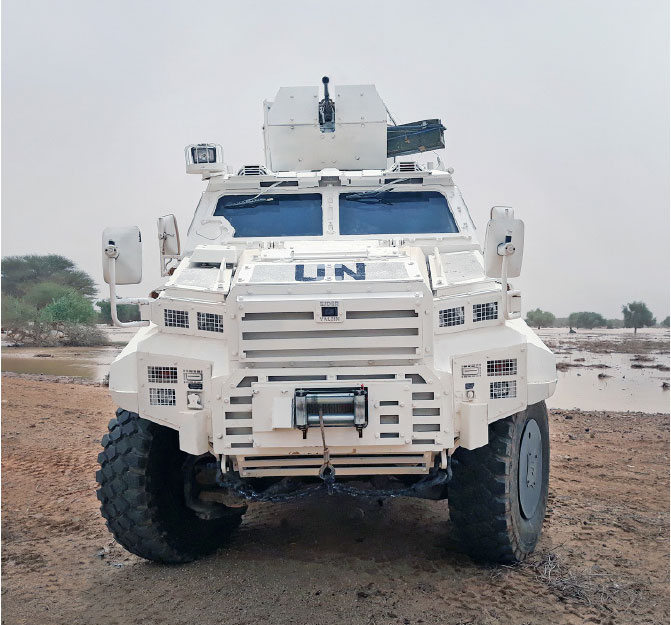Malaysia UN Troops in Lebanon to Receive 20 Turkish-Made ‘Panthera’ Armored Vehicles in January
According to Malaysia Chief of Defense Forces, General Tan Sri Mohammad Ab Rahman, the acquisition of 20 units of the 4x4 "Panthera" armored vehicles (a variant of the Ejder Yalchin armored vehicle) from Turkey will cost RM190 million (approx. US$42 million) and is intended to replace the "Condor" armored vehicles currently used by Malaysian peacekeeping forces in Lebanon.
(DEFENCE SECURITY ASIA) — The Malaysian peacekeeping force or “MALBATT, currently in service with the United Nations (UN) in Lebanon, is set to receive 20 units of the “Panthera” 4×4 armored vehicles manufactured by Turkey in January next year.
This announcement was made today by the Chief of Defense Forces, General Tan Sri Mohammad Ab Rahman and was quoted by local media.
According to Mohammad, the acquisition of the 20 units of the 4×4 “Panthera” armored vehicles (a variant of the Ejder Yalchin armored vehicle) will cost RM190 million (approx. US$42 million) and is intended to replace the “Condor” armored vehicles currently used by Malaysian peacekeeping forces in Lebanon.
The Malaysian peacekeeping forces are part of the blue-helmet United Nations Interim Force in Lebanon (UNIFIL).
Furthermore, Mohammad also disclosed that the government has approved a budget of RM400 million (approx. US$88 million) for the acquisition of 60 units of High Mobility Light Tactical Vehicles, which will also be utilized by Malaysian peacekeeping forces in the volatile region of Lebanon.

“We will receive this RM400 million acquisition next year, but it will take some time as it is tailored to our needs. We specify the type of weapons and the electronics we want, so it takes time,” he said, as quoted by local media.
The Chief of Defence Forces made these remarks after attending the Ceremony of the United Nations National Service Medal Presentation (PNBB) and the Disbandment of MALBATT 850-10 at the Parade Ground, Army Basic Training Center (Pusasda), in Negeri Sembilan today.
In a statement through the Malaysian Army’s social media account at the end of last year, it was explained that the name “Panthera” or its scientific name “Panthera Pardus” was chosen because this animal adapts well to various habitats worldwide, aligning with the armored vehicle’s capability to maneuver in all conditions.
The original name of the Turkish vehicle is “Ejder Yalchin,” but it is now known as “Panthera”, most probably for ease of pronunciation.
The “Panthera” armored vehicle, manufactured by Nurol Makina, was introduced in Malaysia in 2018 and has undergone various tests in the country.

Initial expenses for the purchase of these Turkish-made armored vehicles could be borne by the government, with reimbursement expected from the UN later.
The “Panthera” armored vehicles will join the Mine-Resistant Ambush Protected (MRAP) IAG Guardian vehicles also used by Malaysian peacekeeping forces in Lebanon.
Both the “Panthera” and “Guardian” armored vehicles provide better protection to Malaysian peacekeeping troops in Lebanon against threats such as gunfire, Improvised Explosive Devices (IEDs), shrapnel, and others, compared to the “Condor” armored vehicles or other soft-skinned vehicles used in daily missions in the tumultuous country.
During the DSA 2022 exhibition in Kuala Lumput, Nurol Makina and a Malaysian company, NADI Corp signed the final configuration review acceptance for the Ejder Yalchin (Panthera) vehicle.
The specifications of the Nurol Makina armored vehicle include a weight ranging from 12 to 14 tons, capable of carrying various payloads weighing up to 4 tons.

This armored vehicle can reach speeds of up to 110 km/h with an operational radius of 600 km, powered by a 300 horsepower engine.
The “Panthera” (Ejder Yalchin) has the capacity to transport up to 11 fully armed military personnel and can be equipped with heavy machine guns and an Automatic Grenade Launcher.
However, it is uncertain what weaponry the “Panthera” will use in Lebanon, with the likelihood being a 7.62mm machine gun utilizing a Remote Control Weapon Station (RCWS) for enhanced protection of its occupants/weapons operator.
The use of larger-caliber weaponry is likely to face strong objections from the Israeli military. — DSA

DEFENCE SECURITY ASIA APPS
To advertise contact: haikalhamas73@gmail.com


Comments are closed.